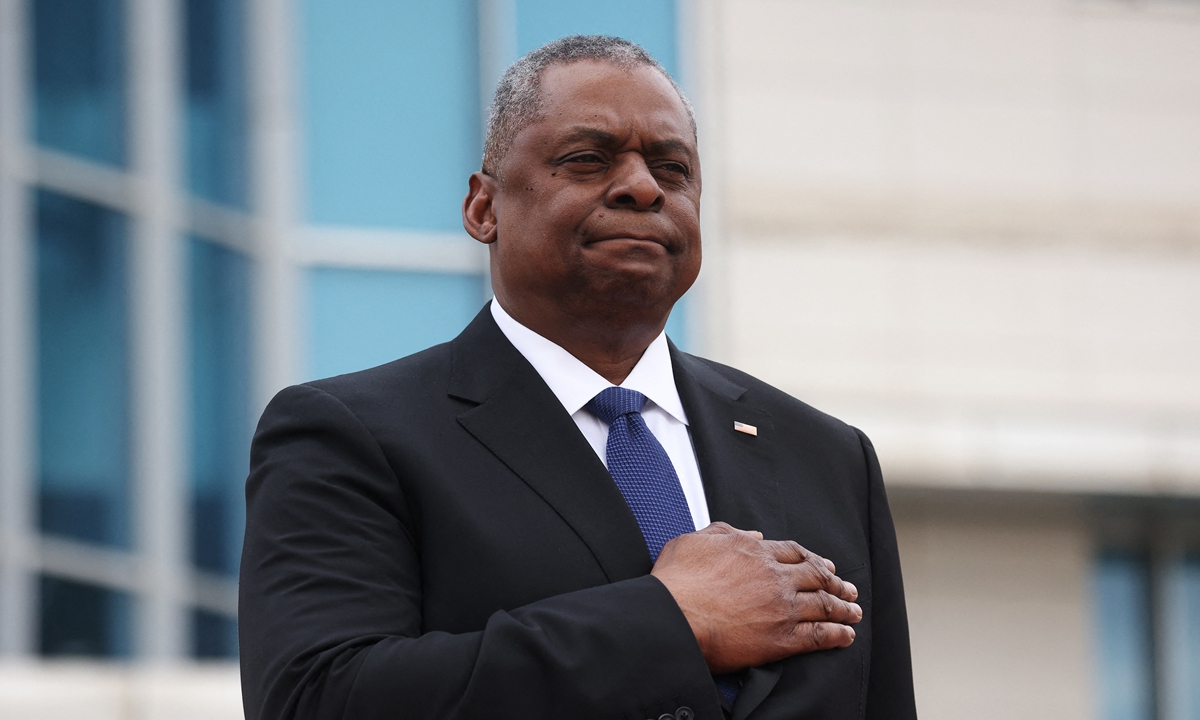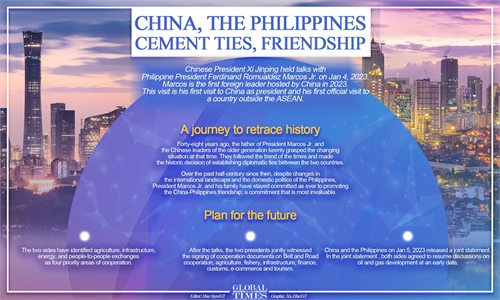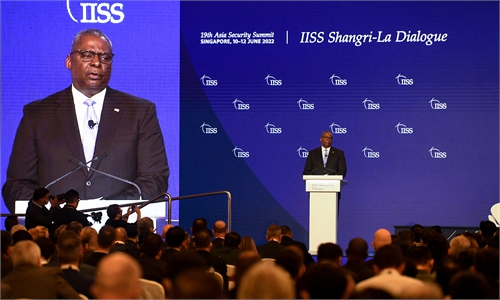The Philippines will not be easily deceived as US thinks: Global Times editorial

US Secretary of Defence Lloyd Austin observes the national anthem during a ceremonial welcome at the Defence Ministry in Seoul on January 31, 2023. Photo: AFP
US Defense Secretary Lloyd Austin who is on a visiting tour to South Korea met with his South Korean counterpart on Tuesday. A senior US official, who briefed reporters on the condition of anonymity, targeted China again, claiming a "a sharp uptick in destabilizing PRC [People's Republic of China] operational behavior," including what was described as "dangerous air-to-air intercepts" and use of "swarms of maritime militia vessels" in the South China Sea.Austin will leave South Korea for a visit to the Philippines. The official probably said what Austin is going to say in the Philippines in advance. This set of platitudes that hype the so-called China threat must have bored people.
Before Austin arrives in the Philippines, the US media have already begun to hype a "big news," saying that Austin would reach an agreement with Philippine President Ferdinand Romualdez Marcos Jr. to open four US military sites at Philippine bases, one of which is located in Luzon Island and another located in Palawan, which was visited by US Vice President Kamala Harris last November. The two places are close to China's Taiwan island the Nansha Islands respectively. The intention of targeting China could not be more obvious. At present, the US military already has five bases in the Philippines on a rotating basis. Adding four more will mean that US-Philippines military cooperation has taken another step forward. This is exactly what the US is striving for.
After Marcos was elected president, the Philippines became Washington's key target to woo. Joe Biden was the first foreign leader to call to congratulate Marcos, and senior Washington officials visited the Philippines intensively. If this agreement is reached, it can be regarded as a result of the several months' efforts. With so many diplomatic and political resources invested, the US State Department and the Pentagon truly need to hand over some decent "political achievements" to comfort domestic voters, and it looks better when written in PPT.
The main significance of this agreement that the US is pushing hard may be that it can be viewed as a "diplomatic and military achievement project" for Washington. In order to deal with China, the US is running around the world, especially around China. It is very busy and also exhausting. If Washington's China strategy is compared to a listed company, then it is wasting investors' money in a wrong way. It is a bottomless pit that consumes much but produces little value, let alone making any profit. If it doesn't change course, it will go bankrupt sooner or later.
The US and the Philippines are military allies. Whether and how to strengthen military relations is supposed to be a matter between the two countries. But the problem now is that the Philippines wants to ensure its own security, while Washington has tried every means to "set a trap" for the Philippines, deliberately linking the cooperation between the two to the "China threat" and trying to push the Philippines to the front line of confrontation with China. The difference between the two is obvious. US Secretary of State Antony Blinken's high-profile visit to the Philippines last year reaffirmed the US' "security commitment," while Manila said it could not afford "any further escalation of tensions in the region." Over the past few years, Manila has always maintained strategic sobriety. It knows clearly where its national interests lie.
The Philippines emphasizes that its military cooperation with the US "does not target any specific third party." Americans also know that this is because the Philippines is unwilling to "choose sides" between China and the US. This attitude is both clear and firm. But if it does not aim at China as a "third party," the US would not have such a great interest in wooing the Philippines. In other words, there are fundamental differences in the stances and interests of the US and the Philippines, which not only requires the Philippines to carefully balance, but also adds Washington's diplomatic costs and weakens its diplomatic effectiveness.
Now senior officials in Washington are becoming keener to talk about the "Taiwan Straits crisis" with the Philippines. American public opinion has also followed suit, often declaring out of context that the Philippines is highly concerned about the situation in the Taiwan Straits, implying that Manila may get involved. However, the Taiwan question has nothing to do with the Philippines. In a recent exclusive interview with the Financial Times, Marcos reiterated the "one China" policy and mentioned "peace" many times. This shows that regarding the Taiwan Straits, the Philippines doesn't want war and chaos, so that it will not suffer from the spillover effect. For Manila, it is especially important to see clearly who the real instigator in the Taiwan Straits situation is.
How to prudently balance its relationship with major powers is a huge test for Manila, but the scale it can advance should be drawn around the center of its own national interests. The Philippines was once a colony of the US, and it is still a military ally of the US in the Asia-Pacific region. The largest overseas base of the US military was once in the Philippines, but the Philippines took back the sovereignty of the base from the US in 1992. In front of the US, unlike some other countries, the Philippines has generally demonstrated the independence of a sovereign state. We also hope that the Philippines can maintain this tradition and display its strategic steadiness and political wisdom.


